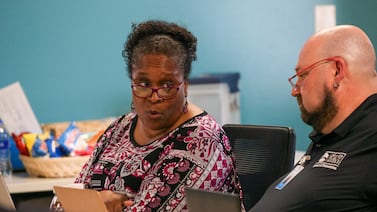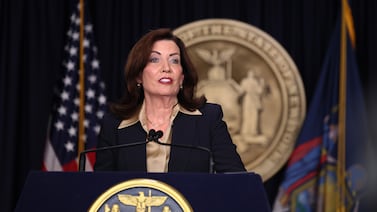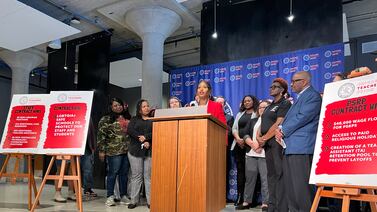Sign up for Chalkbeat’s free weekly newsletter to keep up with how education is changing across the U.S.
There remains a startling disconnect between the public’s perception of American schools versus parents’ views of their own child’s education, according to the latest polling data from Gallup.
Americans’ views of the country’s schools have continued to fall, with just 36% saying they’re satisfied with U.S. education. This is tied for the lowest point on record since Gallup’s survey began in 1999.
In contrast, parents give their own child’s schools and teachers high marks: 76% say they’re completely or somewhat satisfied with their oldest child’s education, a figure that is similar to levels before the pandemic.
The 40-point gap between the public’s and parents’ perception of schools is the second highest on record. And it suggests that while critiques of American education seem to be making inroads with the public, they don’t appear to reflect most parents’ own experiences.
“Americans’ satisfaction with the quality of K-12 education in the U.S. has fallen to a record low point as a new school year begins,” wrote Megan Brenan, a research consultant at Gallup. “Still, parents of elementary and secondary school students remain quite satisfied with the education their child is getting, and they offer mostly positive reviews of the performance of their children’s teachers.”
Contrasting views about American schools between parents and the broader public has been a long-standing phenomenon, shown since Gallup began polling.
The pandemic appears to have turbocharged this gap. Republican politicians have castigated many public schools for remaining virtual into the fall of 2020, imposing mask mandates, and — in their telling — advancing left-wing curriculum on race and gender. Consistent with that, Gallup found a particularly steep decline in satisfaction with American education among Republicans: it fell from 49% in 2020 to 25% this year.
The public’s declining perception may also reflect a variety of other, widely publicized challenges that schools have faced of late: steep academic learning loss, rising teacher turnover, and a stunning increase in student absenteeism.
A separate recent survey from EdChoice, a group that backs publicly funded private school choice, found a spike in the share of Americans who say K-12 education is headed in the wrong direction.
But despite the unprecedented upheavals in American education, parents have remained fairly satisfied with their own child’s school, including how officials have handled the pandemic and how teachers have taught about race. Close to three-quarters of parents rate their child’s teacher as excellent or good, according to the latest Gallup data. A recent EdChoice poll found that while only 30% of non-parents said local schools were going in the right direction, 59% of parents said they were.
Gallup’s poll does not break down parent satisfaction by school type. Other surveys have found that parents whose children are in private school tend to be more satisfied, although public school parents also give their child’s education high marks. Since the pandemic, enrollment has shifted toward charter, private, and homeschooling, although the vast majority of children are still educated in district public schools.
Notably, parents’ sunny views about their own child’s schooling do not extend to education writ large. They hold similarly pessimistic views as non-parents about schools in the country as a whole, according to Gallup.
This seems to mirror polling data about the economy: While most Americans say their personal finances are in good shape, they give the broader economy low marks.
Matt Barnum is interim national editor, overseeing and contributing to Chalkbeat’s coverage of national education issues. Contact him at mbarnum@chalkbeat.org.







